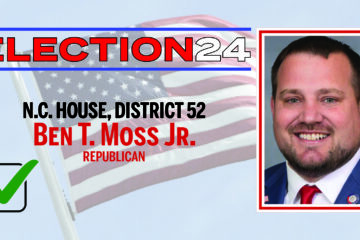RALEIGH — On Dec. 1, Governor Roy Cooper announced his appointment of Judge Regina M. Joe to Superior Court District 19D which serves Hoke and Moore Counties, and attorney Krystle Melvin to District Court in District 16B, which serves Robeson County.
“These appointees bring to the bench years of legal experience in the public and private sectors and have served North Carolina and their communities well,” Cooper said in a press release. “I appreciate their continued commitment to serving the people of our state.”
Judge Joe has been a District Court Judge since 2007 and in the past was a Public Defender in Hoke and Scotland Counties as well as working in the District Attorney’s offices in Hoke, Scotland and Pitt Counties.
Melvin is an Associate Attorney in private practice at the Charleston Group. She has previously been an Assistant District Attorney in Robeson County and a staff attorney at the Cumberland County Department of Social Services.
Joe’s District 19D appointment fills the vacancy created by Judge James Webb, who recently retired with more than a year left before his current term ends on Dec. 31, 2024. Webb assumed the 19D role on Jan. 1, 2019.
Webb has also been a judge for the North Carolina 5th Superior Court Division Judicial District 19B. He ran for and retained the seat after running unopposed in 2016.
In early October, a ceremony unveiling a portrait of Webb was held to honor his service. The portrait will be hung in the Carthage courthouse.
Webb’s days on the bench have included some controversies, such as the N.C. Court of Appeals overturning his sentencing in the 2013 case of Zachary Thomsen, a man who admitted to raping an 8-year-old child when he was 18 years old.
Webb had ignored state sentencing rules by rejecting a plea agreement of a 25-year minimum sentence for first degree rape and sexual offense charges against Thomsen. Webb lowered the sentence 12 years; less than half of the recommended sentence.
To support his sentencing recommendation, Webb had cited the Eighth Amendment and had argued individuals convicted of second-degree murder received shorter sentences than Thomsen faced.
Webb’s sentencing decision was appealed by the state and in a 2015 ruling by a N.C. Court of Appeals three judge panel, Webb’s sentencing order was vacated and ordered a new sentencing hearing.
An appeal by Thomsen reached the N.C. Supreme Court which issued an opinion confirming the Court of Appeals decision in 2016.
Over the past two years since the pandemic, Webb had apparently been interpreting the definition of “good cause” in statute with relation to probation fees.
Per state statute, “The court may exempt a person from paying the fee only for good cause and upon motion of the person placed on supervised probation.”
North State Journal reported earlier this year in May that Webb had been waiving probation fees if parolees provide “voluntary proof” of full COVID-19 vaccination to probation officers.
Probation fees are typically around $40 but can be higher and are required to be deposited into the state’s General Fund.




